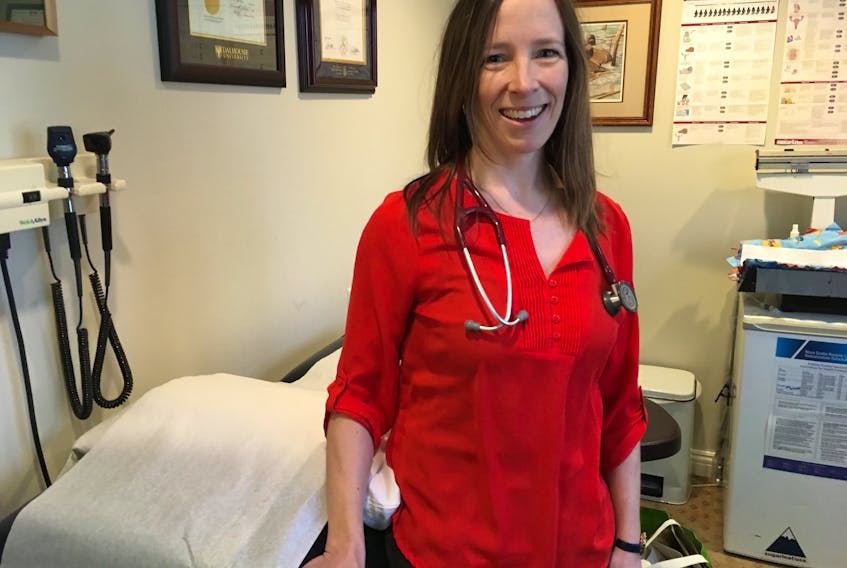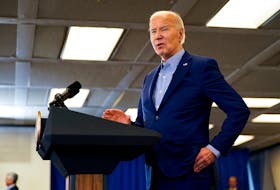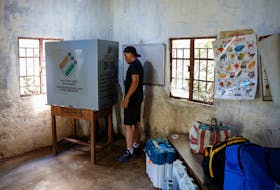WOLFVILLE, NS - Dr. Alison Wellwood has her fair share of concerns as a family doctor in an area with thousands of unattached patients.
And she knows she’s not alone.
“There’s a lot of pressure from unattached patients to add to your practice at the Wolfville Professional Centre and that’s a real challenge,” says Wellwood.
Wellwood is a fee-for-service physician with an office-based practice, an attending physician at Student Health Services at Acadia University, a hospitalist physician at the Valley Regional Hospital in Kentville and an assistant professor in the Department of Medicine at Dalhousie University.
And she’s deeply concerned by the number of patients in Kings County without a family doctor.
“For patients who have a physician, they have access to timely appointments for basic issues that can be kept uncomplicated and their chronic disease can be better managed because somebody is looking after that kind of care,” she says.
This is particularly true for individuals with complex mental health issues and serious chronic diseases.
“They need a lot of preventative maintenance kind of care that there are very clear guidelines on how to follow, and they show up at (walk-in clinics) just asking for refills of their medications. Nobody’s really following them and looking over time. They don’t get consistent direction.”
The heart of the issue
Wellwood believes exorbitant overhead costs and workload demands associated with running a family practice are at the heart of the underlying physician retention and recruitment issues.
“Part of why our system is broken is that people are not taking on patients and maintaining office practices,” she said.

She doesn’t blame them.
“I do happen to think that more fairly compensating office-based practice would help address this problem,” she said.
Wellwood initially returned to the Annapolis Valley to work alongside her mother, who was a general practitioner in Wolfville for 41 years. She takes pride in her role as a primary care provider and advocate for her patients.
“I stay in it because I love it. I love the relationships with my patients. I have great staff to work with. It’s really stimulating, from an academic point of view. You’re always learning new things.”
That said, she understands why some doctors might view other options as more appealing considering the current payment models.
Read more about the family doctor crisis in Kings, Annapolis counties:
• ‘We shouldn’t have to wonder’: Doctor shortage hits home for Annapolis Valley
• More than 6,000 people in Kings and Annapolis counties don’t have family doctors. Meet some of them
• Pharmacists ‘willing and able to help’ with doctor shortage stress
• ‘Recruitment mode for years to come’
Stress impacting patients, physicians
Wellwood feels many system-based frustrations could be addressed with incentives that reward doctors for taking on patients, running a full-scope family practice and addressing complex cases.
“It’s really expensive to run an office practice, and it actually is very stressful,” she said, noting that the fee-for-service payment model puts a lot of pressure on physicians wanting to take the time to be thorough with patients.
“I’m really concerned that if we don’t make a change, physicians will continue to leave office practice.”
Wellwood worries that the result of a doctor shortage is a two-tiered medical system for patients, which ultimately leads to increased costs at the tertiary care level for some patients without regular access to a general practitioner.
“It is stress that’s happening from having all of these unattached patients. It’s impacting us as providers, but it’s impacting patient care, too,” says Wellwood, noting that many physicians work in excess of 60 hours per week.
“We’re always teetering on burnout.”
Wellwood is, however, pleased that Dalhousie’s Postgraduate Family Medicine Training Program has resulted in several new recruitments in the Annapolis Valley in recent years.
“I understand this is a sought-after training site, too. Off the top, I can think of three new grads in Berwick, one or two in the Kingston area, and two in Wolfville who have come out of that training program and… set up office-based practices just over the past few years,” she said.
A better way forward
Like Wellwood, Kevin Chapman, director of finance and partnerships for Doctors Nova Scotia,
believes it is time to reevaluate the payment structures to ensure compensation aligns with the level of care being delivered.
“We have to look at how physicians are paid and kind of move away from fee-for-service as much as is possible. Until then, we have to try to make sure the fee-for-service payment system reflects the complexity of the patients as much as we can. It’s not a good environment for anybody if somebody has to work longer for the same amount of money,” he said.
“The problem, I think, is as patients get older and more complex, your ability to see patients in the same amount of time get comprised.”
Chapman said doctors in emergency departments and walk-in clinics note an increase in demand for service as a result of a family physician shortage in an area.
“They’re seeing more and more patients coming to the emergency department without a family physician, and that makes it difficult. If you order lab and X-ray and different things, who is going to follow up? The continuity of care is compromised,” said Chapman, adding that walk-in clinics are essential for “orphan patients” but the ideal scenario has patients paired with their own primary care provider.
“Our belief is that patients are better served by attachment to a family practice.”









